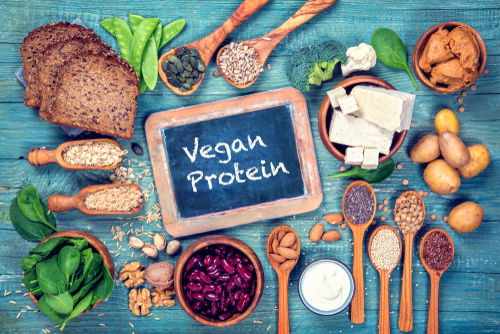Vegans Should Eat a Variety of Plant-Based Protein

An increased protein intake can boost your metabolism and, especially when combined with strength training, may help you build muscle that burns more calories than fat. Research studies have suggested that a protein intake around 30% of total calories may be an optimal number for losing weight. For someone on a 2,000 calorie-per-day diet, this would be around 150 grams of protein. Protein plays an essential role in maintaining the "salt and water" balance inside your blood vessels. Consuming a diet that is too low in protein could lead to a medical condition called edema, which is swelling in the legs and feet due to fluid build-up. If you are following a vegan or vegetarian diet, you should eat a variety of plant-based foods to get the required range of amino acids. This includes high-protein foods, such as tofu, lentils, nuts, seeds, and quinoa.
Mistakes That Slow Down Your Metabolism
Keeping your metabolism working correctly is crucial for losing weight and keeping it off. Unfortunately, lifestyle mistakes can slow your metabolism in counterintuitive ways, such as:
- Don't Overdo Calorie Cutting - While eating too much food is an obvious cause of weight gain and can make it difficult to lose weight, eating too little can also hinder your ability to shed pounds.
- Too Little Protein - As part of a balanced diet, replacing some carbs with lean, protein-rich foods like beef, fish, nuts or low-fat dairy can boost your metabolism at mealtime.
- Lack of Strength Training - Strength training with light free weights is important for building and retaining muscle mass. The more muscle you have the better the burn.
- Sedentary Lifestyle - You know that prolonged periods of sitting around too much is really bad for your metabolism. So, limit your time in front of the TV. At work, a standing desk can provide an increase in metabolism to help you avoid weight gain.
- Sleep Deprivation - Poor sleep habits due to excess stress can lead to imbalances in appetite-regulating hormones, which can cause you to crave bad food options and ignore signals when you should stop eating.
Studies have shown that the stress hormone cortisol can slow down your metabolism. It is important that you learn how to keep stress at bay to raise your energy levels and maintain a healthy metabolic rate.
Medical Conditions Can Affect Metabolic Rate
Weight gain is a complicated process and likely depends on a combination of your metabolic rate, genetic makeup, hormonal balance, menu plan and a host of lifestyle issues, such as sleep quality, physical activities, and your ability to manage stress. Having a higher metabolic rate means your body is using food for fuel and heavier individuals have higher metabolic rates than their thinner counterparts to meet the increased demands of their larger bodies. Specific illnesses can affect the speed at which you burn energy (metabolic rate). For example, if your body does not make enough thyroid hormone, it can be easy to gain weight and difficult to lose it. Unlike men, when women go through menopause, their estrogen levels drop, which can lower their metabolic rate causing them to accumulate unwanted belly fat.
For more than three decades, Metabolic Research Center has been cautioning clients as to the dangers of following fad diets as well as how crash diets can reset the body's metabolic rate making it more difficult to lose weight. If you have been searching online for protein products that can curb your appetite and improve your metabolic health, visit the MRC location nearest you or use this website's convenient Contact Us form for a prompt response to all of your questions.
By submitting this form, you agree to receive marketing text messages from us at the number provided, including messages sent by autodialer. Consent is not a condition of any purchase. Message and data rates may apply. Message frequency varies. Reply HELP for help or STOP to cancel. View our Privacy Policy and Terms of Service.

